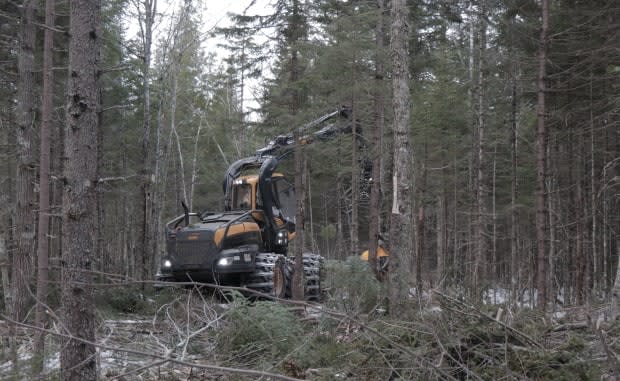Forestry industry vows to help carry out Lahey report as N.S. awaits new premier

(Michael Gorman/CBC - image credit)
Members of Nova Scotia's forestry industry are declaring their support for implementing the recommendations of the Lahey report on forestry practices, but they're also voicing concern about potential changes to how private land is managed.
The Wood Product Manufacturers Association of Nova Scotia sent a letter Wednesday to premier-designate Iain Rankin offering the organization's full support and a promise to "work collectively with government to achieve the positive benefits that our provincial forest resources offer."
The letter comes five days after the NDP released a document it received showing half the members of an advisory committee to the minister of lands and forestry called for a moratorium on clear cutting last November until the Lahey report could be put into action.
Released 2½ years ago, the report by University of King's College president Bill Lahey includes 45 recommendations that ultimately call for a more sustainable approach to managing forests and steps that would lead to a reduction in clear cutting.
Rankin, a former minister of lands and forestry who was elected Liberal leader earlier this month, has promised to put the report into action this year. He's expected to be sworn in as premier next week.

Casse Turple, a director with the Wood Product Manufacturers Association, said the group saw reaching out to Rankin now as a chance for a new start with government while also formally voicing public support for the Lahey report.
"We just wanted to make sure that we told the story from our side in the sense that we do support where forestry is going and we do support the Lahey report and the triad approach that they are suggesting," said Turple, who also works at Ledwidge Lumber in Enfield.
"We are fully behind going forward with that on Crown land to see how it works out."
Marcus Zwicker, general manager of the mill consortium WestFor, said putting the report into action would give industry certainty about the future while also addressing concerns some people have about how Crown land is being managed.
"As a sector, we want to implement it tomorrow — the whole thing," he said in a recent interview.
Concern for landowners' rights
While the association supports changes on Crown land, Turple said it's the group's view that private landowners should be "left to their own devices for now" and then encouraged to implement some of Lahey's suggestions if they want to do so.
"Their rights should be respected," she said.
The comments are as much about expressing support for the Lahey report as they are about voicing some preemptive concerns about what Rankin could be planning for next month when the legislature is scheduled to resume sitting.
In pledging to put the report into action, Rankin promised to pass the Biodiversity Act as soon as possible.
Finding new markets
Previously shelved, the legislation is a recommendation of the Lahey report. Some landowners and industry members are unhappy that the bill, or at least the last version they saw, would apply to the way all land is managed, not just Crown land.
"My understanding is that [some private landowners] would be very concerned with a new piece of legislation like that," said Turple, noting that she does not speak on behalf of private woodlot owners.
Rankin has yet to say how, if at all, the Biodiversity Act he plans to bring in as premier differs from the bill he tried to pass as minister.
The association's letter also calls on continued efforts to find new markets for low-grade wood and byproducts. The closure of Northern Pulp more than a year ago left a large void in that market, although some industry members are pursuing other avenues, including a biochar facility and district heating projects.
Last year, the government also allowed for an increase in biomass used for generating electricity.
MORE TOP STORIES

 Yahoo Movies
Yahoo Movies 